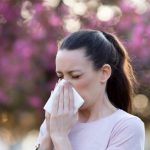Allergy ALERT: Here is how to reduce your exposure to allergens plus 5 natural solutions
 (NaturalHealth365) According to the Asthma and Allergy Foundation of America, more than 50 million Americans experience allergies of some sort every year. And with spring in full swing, millions of us are about to experience the hallmark sneezing, itchy throats, and watery eyes that signal hay fever in full effect.
(NaturalHealth365) According to the Asthma and Allergy Foundation of America, more than 50 million Americans experience allergies of some sort every year. And with spring in full swing, millions of us are about to experience the hallmark sneezing, itchy throats, and watery eyes that signal hay fever in full effect.
Want to find relief that doesn’t depend solely on the pharmacy? Let’s review some of the most effective natural allergy options we know about.
HEPA filters, probiotics, and these additional allergy solutions might give you relief this spring and summer
If you’re trying to stay away from prescription or over-the-counter antihistamines, consider adding a variety of natural allergy relief remedies into your daily routine. Some may work for you better than others, so experiment with a few.
HEPA filters: It’s not clear if HEPA (high-efficiency particulate air) filters always or significantly improve allergy symptoms, but we do have some studies that support their use. For instance, one 2018 study from the Asian Pacific Journal of Allergy and Immunology found that the use of HEPA filters improved clinical symptoms of allergic rhinitis as well as reduced the amount of particulate matter in the air.
Probiotics: In 2015, a systematic review of 23 studies concluded that “probiotics may be beneficial in improving symptoms and quality of life in patients with allergic rhinitis,” but note that further research is needed to clarify recommendations. Currently recommended amounts for probiotic supplements range widely, from 1 billion to 10 billion or more colony-forming units (CFUs). The scientific plausibility of probiotics alleviating allergy symptoms is considerable, given that probiotics support gut and immune health.
Acupuncture: Ever tried acupuncture? A 2015 review of 13 papers, including 2,365 participants, published in the American Journal of Rhinology & Allergy, found that acupuncture appears to be a safe and valid natural remedy for allergy relief.
Frankincense oil: Inhaling this fragrant essential oil (either by putting it in a diffuser or placing it in a carrier oil and dabbing it behind the ears) may reduce fatigue, ease symptoms, and improve quality of life in people who have seasonal allergies, according to a 2016 randomized controlled trial. Other essential oils touted for their allergy-relief benefits include peppermint oil and eucalyptus oil.
Quercetin: Laboratory studies have found that this nutrient — found in foods like broccoli, cauliflower, onions, citrus fruits, grapes, and green tea — prevents the release of histamine, which is a key compound involved in the body’s allergic response. We don’t have strong human data to prove its effectiveness at reducing allergy symptoms, but anecdotal evidence suggests it offers benefits. Other nutrients and supplements said to promote allergy relief include vitamin C and the blue-green algae spirulina.
Here are 5 ways to reduce your exposure to allergens
Treating allergies, whether with medications or natural remedies, is important for improving your quality of life. But preventing an allergic response in the first place matters, too. Here are five simple ways to avoid your exposure to allergens in your home and community:
- Check the pollen forecast: Input your town and zip code at Pollen.com or a similar resource, so you’ll know how bad the pollen is in your area and will be prepared to take more preventive action.
- On high pollen count days, stay indoors and close the windows.
- When going outside, wear wraparound sunglasses to block allergens from your eyes, and try putting some Vaseline around your nose to trap pollen particles!
- Shower before going to bed to avoid bringing pollen and debris onto your pillowcase and bed linens.
- Vacuum and dust regularly.
And, finally, as a “bonus tip,” many integrative healthcare providers will remind you to avoid conventionally-produced dairy products, sugar or flour-based food products because they tend to cause mucus buildup.
Sources for this article include:
Pollen.com
AAFA.org
NIH.gov
APJAI-journal.org
NHS.uk
NIH.gov
EPA.gov
Harvard.edu
Hindawi.com
MountSinai.org
NIH.gov



